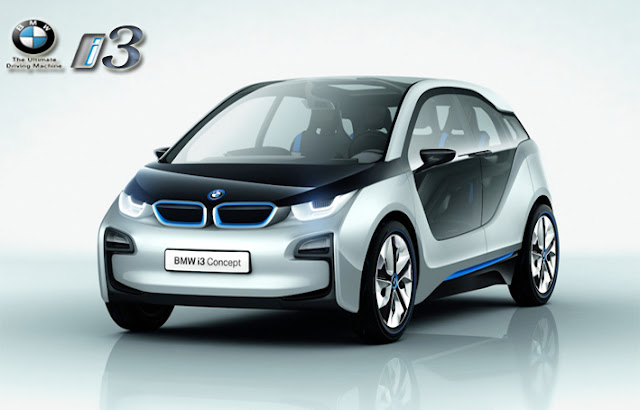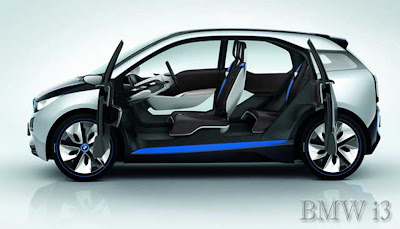BMW has finally given us our first authorized, unconcealed look at its advanced, all-electric city car. For now the i3 is tranquil labeled an idea, but this car is greatly added complete than the Megacity concept that preceded it. The four-passenger i3 concept is possibly the most advanced take on electric cars yet, and draws on BMW's familiarity with a fleet of 600 Mini E and 1000 BMW Energetic electric cars.
The i3 is built around a new skeleton concept called Life Drive, which divides the vehicle into sections for Life, the passenger section, and Drive, the power train and battery. For the i3, the bottom half of the car is the Drive section, and is completed typically of lightweight aluminum; the Life passenger section sits on top and is built since Carbon-Fiber Reinforced Plastic (CFRP). Employing this lightweight equipment keeps the i3's weight along to just 2750 pounds.
BMW says that CFRP is as muscular as but 50 percent lighter than steel. Better yet, it never rusts and supposedly offers better security than steel in a crash. CFRP only forms the Life sections shell, however, as expendable plastic panels form the i3's true framework. The i3's electric motor was developed by BMW because the company required fixed control over the feel and performance of its power trains. It is rated at 170 hp and 184 lb-ft of torque, and has single-speed diffusion.
The motor is feed by a liquid-cooled lithium-ion battery pack that is mounted below the floor of the passenger section. This means there is no interruption or diffusion subway in the cabin, and also helps keep the i3's center of gravity low for better behavior and strength.
Though the highest range per charge is rated at 140 miles, BMW admits real-world i3 mileage will be between 80 and 100 miles. Statistics from the Mini E trials trained BMW that a battery range of 74 to 93 miles would gratify 90 percent of all drivers. The i3 concept can reach 62 mph in 7.9 seconds, and its top speed is partial to 93 mph because BMW says superior velocities would drain the battery too speedily.
A full charge is said to take just six hours via a typical European passage, while an optional fast-charger succumb an 80-percent charge in just one hour. Charge times on American 120-volt outlets will expected is longer.
The i3 is built around a new skeleton concept called Life Drive, which divides the vehicle into sections for Life, the passenger section, and Drive, the power train and battery. For the i3, the bottom half of the car is the Drive section, and is completed typically of lightweight aluminum; the Life passenger section sits on top and is built since Carbon-Fiber Reinforced Plastic (CFRP). Employing this lightweight equipment keeps the i3's weight along to just 2750 pounds.
BMW says that CFRP is as muscular as but 50 percent lighter than steel. Better yet, it never rusts and supposedly offers better security than steel in a crash. CFRP only forms the Life sections shell, however, as expendable plastic panels form the i3's true framework. The i3's electric motor was developed by BMW because the company required fixed control over the feel and performance of its power trains. It is rated at 170 hp and 184 lb-ft of torque, and has single-speed diffusion.
The motor is feed by a liquid-cooled lithium-ion battery pack that is mounted below the floor of the passenger section. This means there is no interruption or diffusion subway in the cabin, and also helps keep the i3's center of gravity low for better behavior and strength.
Though the highest range per charge is rated at 140 miles, BMW admits real-world i3 mileage will be between 80 and 100 miles. Statistics from the Mini E trials trained BMW that a battery range of 74 to 93 miles would gratify 90 percent of all drivers. The i3 concept can reach 62 mph in 7.9 seconds, and its top speed is partial to 93 mph because BMW says superior velocities would drain the battery too speedily.
A full charge is said to take just six hours via a typical European passage, while an optional fast-charger succumb an 80-percent charge in just one hour. Charge times on American 120-volt outlets will expected is longer.


No comments:
Post a Comment